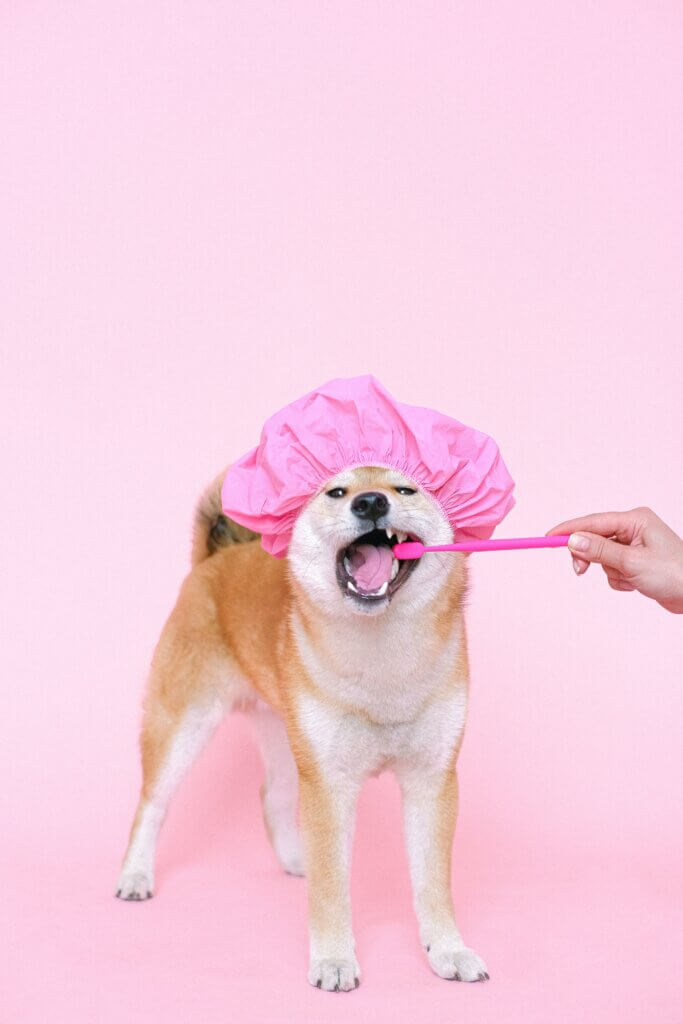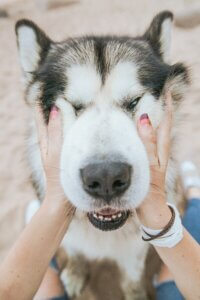What to Do and Buy for Pet Dental Health Month This February

When you get those sweet, sloppy doggy kisses, do you find yourself turning your head away because of your dog’s stinky breath? February is Pet Dental Health Month, so there is no better time to address the issue of halitosis, as well as other dog teeth issues.
Pet dental health is more important than you may realize. Just like there are correlations between our oral health and our overall health, the same should be expected for our four-legged family members.
For example, your dog’s smelly breath may be a sign of canine periodontal disease. The American Kennel Club (AKC) explains, “Periodontal disease can cause some serious health issues for our canine companions, so it’s essential to maintain adequate oral hygiene. Untreated dental disease can cause tooth loss, and it can lead to painful abscesses and systemic infections throughout your dog’s entire body.”
This connection between pet dental health and overall health and well-being is the reason why the American Veterinary Medical Association (AVMA) sponsors National Pet Dental Health Month every February. They want to raise awareness of the importance of pet dental health, and so do we!
Why Pet Dental Health Matters
Pet Dental Health Month is meant to be a motivator and not a discourager. Don’t feel guilty if you have not prioritized your dog’s oral care or didn’t know about this awareness month. You’re not the only one. Statistics from Bosley’s of Pet Valu suggest:
- 60% of pet owners do not provide the dental care that is recommended as essential by veterinarians.
- Only 15% of dog owners have purchased a toothbrush and toothpaste for their dog.
- As little as 2% to 4% of pet owners actually brush their pet’s teeth.
If you count yourself among these numbers, it’s time to pay more attention to your dog’s teeth. Statistics show that as many as 80% of dogs show signs of oral disease by age three. Red gums, stinky breath, and yellow teeth can be a sign of oral disease, and if left untreated, will have serious consequences.
The AVMA lists the following pet dental health issues that should be checked by your local veterinarian:
- Bad breath
- Broken or loose teeth
- Extra teeth or retained baby teeth
- Teeth that are discolored or covered in tartar
- Abnormal chewing, drooling, or dropping food from the mouth
- Reduced appetite or refusal to eat
- Pain in or around the mouth
- Bleeding from the mouth
- Swelling in the areas surrounding the mouth
Dogs can suffer from periodontal disease (gum disease), as well as infected teeth, abscesses, and broken teeth or roots. This is why your veterinarian needs to perform a simple dental examination during a routine checkup. If it is not part of the routine, ask your veterinarian to check your dog’s teeth.
Keep in mind that if your dog is suffering from dental health issues, such as an infected tooth, you will likely have to pay to have the tooth (or teeth) extracted and possibly a pricey root canal. The high cost associated with pet dental health issues is another reason why dog owners need to prioritize their dog’s dental care.
Basic Pet Dental Care Tips for Dog Owners
By practicing routine pet dental care at home, you can prevent possible oral issues. Stick to the following to keep your dog’s smile happy and healthy.
- Brush your dog’s teeth a few times a week. Don’t worry. This isn’t as difficult as you think. Head to your local pet store and purchase a dog toothbrush or a finger toothbrush. These are designed for canine teeth and the comfort of their owners.
- Choose the right dog toothpaste. You cannot use human toothpaste to clean your dog’s teeth. Many human kinds of toothpaste contain xylitol or fluoride, which are toxic for dogs. Instead, get a toothpaste designed for dogs. You can even find toothpaste with dog-friendly flavors, like peanut butter and chicken.
- Buy some dog dental treats. According to the AKC, “Dental treats for dogs are a very good way to improve your pup’s dental health. These treats are made specifically to remove plaque buildup and often contain ingredients that freshen breath and clean your dog’s mouth.”
- Invest in quality dog chew toys. The simple act of chewing is good for a dog’s teeth because it produces saliva. Specifically, gnawing on dog toys helps remove plaque from a dog’s teeth.
- Schedule routine dental cleanings. Your dog needs a dental cleaning by your veterinarian once a year. During these cleanings, the vet will remove plaque, clean the gum line, and polish your dog’s pearly whites.
How to Brush Your Dog’s Teeth
At this point, you’re probably wondering how you are possibly going to get a toothbrush into your dog’s mouth without a battle. We’d like to tell you there won’t be a fight, but it really depends on your pup. To make it easier on yourself, watch this video from the AVMA of Dr. Sheldon Rubin taking you step-by-step through toothbrushing.
The Big Question About Professional Pet Dental Cleaning
As mentioned, even if you do your best to brush your dog’s teeth and provide chew toys and dental treats, he still needs professional dental cleaning. Many dog owners hesitate because they hear anesthesia is involved, which makes the cleaning seem like a very big deal.
Yes, your dog will be anesthetized for his dental visit, but this is for his safety. The American Animal Hospital Association explains, “Imagine multiple strangers holding you down and speaking a language you don’t understand. They’re shining bright lights in your face and inserting sharp, scary instruments into your mouth that pinch and poke. This is what your pet would endure during a nonanesthetic dental procedure. Without anesthesia, it’s impossible to obtain X-rays to see what lies beneath your pet’s gumline. It is also impossible to safely and effectively clean the teeth using those sharp instruments while the pet is awake.”
While Super Scoopers can’t clean your dog’s teeth, we can clean the mess they leave on your lawn. Show your yard some love this February by scheduling scooping service. Your first visit is FREE when you sign up for weekly services!




